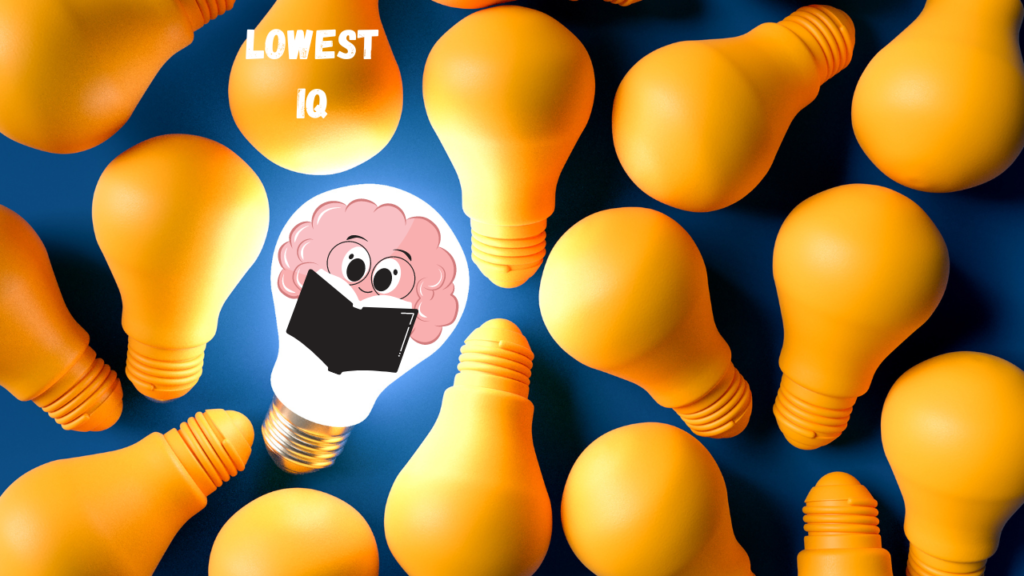Introduction

IQ, or intelligence quotient, is a number that attempts to quantify human intelligence. Over time, it has been a source of much intrigue, often used as a marker of intellectual ability. While most discussions focus on high IQ scores and genius-level intelligence, the curiosity surrounding the lowest recorded IQ in history has also sparked interest. How low can an IQ score go? Low IQ score How do experts measure these extremely low levels of cognitive ability?
In this article, we’ll explore what the lowest recorded IQ in history is, how such cases are tested, and what factors can lead to such low IQ score.
What Is IQ?
Definition of IQ
IQ stands for Intelligence Quotient, a standardized score derived from various tests designed to measure human cognitive abilities in relation to their age group. The average IQ score is set at 100, with most people falling between 85 and 115 on the scale Low IQ score.
Origins of IQ Testing
The concept of IQ originated in the early 20th century. The French psychologist Alfred Binet and his colleague Theodore Simon were tasked with creating a test to identify schoolchildren who needed special education. This led to the development of the first IQ test. Since then, IQ tests have evolved and become one of the most widely used psychological assessments worldwide.
Importance of IQ Tests in Modern Society
Today, IQ tests are used for various purposes, including educational placement, assessing intellectual disabilities, and even determining eligibility for certain jobs. However, despite their wide usage, IQ tests have sparked considerable debate over whether they can truly measure human intelligence in all its forms.
How Is IQ Measured?
Overview of IQ Tests
IQ tests are designed to measure different cognitive abilities, such as logical reasoning, problem-solving, memory, and mathematical skills. There are several types of IQ tests, including the Wechsler Adult Intelligence Scale (WAIS) and the Stanford-Binet Intelligence Scales, each focusing on slightly different aspects of intelligence.
Key Components of an IQ Test
The typical IQ test consists of various sections that measure:
- Verbal comprehension
- Perceptual reasoning
- Working memory
- Processing speed
The cumulative score from these sections results in the individual’s IQ score.
IQ Test Scoring System
IQ tests are scored in such a way that 100 is the average score. Scores below 70 are considered indicative of an intellectual disability, while scores above 130 signal superior intellectual abilities.
The Lowest Recorded IQ in History
Defining the Low IQ Score
While there is no definitive record of the absolute lowest IQ, it is widely accepted that individuals with IQ scores below 20 fall into the “profound intellectual disability” category. Such scores are extremely rare and indicate a significant level of cognitive impairment.
Case Studies of Extremely Low IQ Score
In historical records, there are cases of individuals with incredibly low IQ scores, ranging from 10 to 25. These individuals typically face significant challenges in day-to-day functioning and require constant support and care.
How These Individuals Were Tested
Individuals with extremely low IQ scores are usually tested using modified versions of standard IQ tests, or assessments that focus more on functional abilities rather than purely intellectual tasks. In some cases, testing involves direct observation of the individual’s ability to carry out basic tasks and respond to stimuli.
Causes of Low IQ Score
Biological Factors
Low IQ Score can often be traced back to biological causes, including genetic disorders and brain abnormalities.
Genetic Disorders
Certain genetic conditions, such as Down syndrome and Fragile X syndrome, can result in significantly lower-than-average IQ scores. These individuals often have moderate to profound intellectual disabilities.
Brain Injuries
Severe brain injuries, particularly those that occur during infancy or early childhood, can impair cognitive development, resulting in a low IQ Score.
Environmental Factors
In some cases, low IQ is linked to environmental factors such as malnutrition, lack of access to education, and exposure to harmful substances during early development.
Challenges in Testing Low IQ
Limitations of IQ Tests for Low IQ Individuals
Standard IQ tests may not be adequate for individuals with very low cognitive abilities, as these tests often assume a certain level of verbal and non-verbal communication skills.
Adjustments and Accommodations
To address these limitations, psychologists may use alternative assessments or make accommodations in the testing process, such as simplifying questions or allowing more time for responses.
How Society Perceives People with Low IQ
Stigma and Misunderstanding
Sadly, individuals with low IQ scores often face stigma and misunderstanding. Society may mistakenly equate a low IQ with a lack of worth or potential, which is far from the truth. Many people with low IQs live fulfilling, meaningful lives with the right support systems in place.
Support Systems for Low IQ Individuals
There are numerous programs and organizations dedicated to supporting individuals with intellectual disabilities, offering resources for education, employment, and independent living.
The Role of IQ in Modern Intelligence Measurement
Criticisms of IQ as a Sole Measure of Intelligence
In recent years, experts have argued that IQ tests only measure a narrow spectrum of cognitive abilities. Many critics believe that other forms of intelligence, such as emotional intelligence and creativity, are equally important but not captured by standard IQ tests.
Alternative Measures of Intelligence

To paint a fuller picture of an individual’s cognitive abilities, some psychologists advocate for assessments that measure multiple intelligences, including social, practical, and emotional skills.
Conclusion
While IQ tests provide valuable insights into certain aspects of cognitive function, they are not without their limitations. The lowest recorded IQ scores often reflect profound intellectual disabilities, which may be caused by genetic factors, brain injuries, or environmental conditions. However, IQ is not the sole determinant of a person’s potential, and those with low IQs can still lead meaningful lives with the appropriate support.
IQ, or intelligence quotient, is a number that attempts to quantify human intelligence. Over time, it has been a source of much intrigue, often used as a marker of intellectual ability. While most discussions focus on high IQ scores and genius-level intelligence, the curiosity surrounding the lowest recorded IQ in history has also sparked interest. How low can an IQ score go? Low IQ score How do experts measure these extremely low levels of cognitive ability?
FAQs
1. What is IQ and why is it measured?
IQ is a measure of a person’s cognitive abilities compared to the general population. It’s used to identify strengths and weaknesses in learning and problem-solving.
2. How are IQ scores categorized?
IQ scores are categorized into ranges such as below 70 (intellectual disability), 90-109 (average intelligence), and above 130 (very superior intelligence).
3. Can a person’s IQ change over time?
Yes, factors like education, environment, and experiences can influence IQ scores, although drastic changes are rare.
4. What are the ethical concerns about IQ testing?
Concerns include cultural biases, stigmatization of individuals with low IQs, and the oversimplification of intelligence into a single number.
5. Does having a low IQ limit a person’s potential?
No, a low IQ doesn’t define a person’s full potential. Many people with low IQs lead meaningful, successful lives with the right support.

